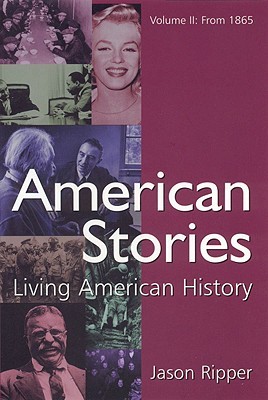Book Review: Jason Ripper’s “American Stories: Vol. II”
by Miles Raymer
“Not one single history book is objective,” Jason Ripper writes in the final chapter of American Stories, Vol. II. “Merely choosing which topics to include and which to exclude indicates an author’s personal understanding of historical significance. Choice is bias” (260). I heartily agree. This admission of bias is in especially good taste given Ripper’s noble efforts to be as balanced as possible in laying out this introduction to the last century and a half of American history. At the cost of indulging a brief and occasionally oversimplified style, Ripper manages to cram quite a lot of useful and well-researched information into fewer than 300 pages, leaving more than enough room for his caustic wit to lighten the mood when necessary.
The most significant shortcoming of Ripper’s book can be found in introductory texts from all disciplines: lack of overarching theme. Whether intentionally or not, Ripper fails to offer a set of thematic guidelines for synthesizing what kind of country America is (or has been). This seriously impedes his ability to weave historical narratives together into coherent wholes and to draw meaningful parallels between disparate moments in time, both of which are crucial for cultivating interest and memory retention in readers. The inauspicious result is history as many glum students have come to know it: “One damn thing after another,” as an old professor of mine loved to say. This traditional approach generates a somber, scholarly authority that readers might begrudgingly trust, but that also perpetuates the false but persistent notion that the real past is far less interesting than the imagined present (or past, or future).
The good news is that Ripper’s sense of humor provides the perspicacious lubrication that keeps American Stories from becoming altogether too dry. What he lacks in thematic scope Ripper makes up for with pithy and insightful summaries:
Peace and prosperity topped the American agenda in 1919, as most Americans––worn out by the nagging of progressives to improve, improve, improve––ditched the reformist crusades of the previous twenty years. The nation had been made rich through war contracts: misery, as it turned out, was good for business. (115)
If you cannot find it on YouTube, it must not have happened. And if it is on YouTube, it must be worth knowing about. (277)
A less informed historian might come off as insincere employing such verbiage, but Ripper pulls it off nicely, reminding readers that history is usually too depressing to take without the occasional comedic jab. His incisive critiques do not lopsidedly favor any particular cultural or political faction, which buys him an extra layer of credibility.
Ripper also knows when to shelve the chuckles; he does not shy away from the dark side of American history. American Stories reminded me that there’s nothing like a history book to drive home the reality that, as messed up as the modern America is, we used to be a lot worse. Take this description of race relations in late the 19th century:
Many whites used lynching as a public tool and spectacle…Audiences of white families…would arrive at a prearranged destination (often advertized by railroads) and participate in the hanging, burning, mutilation, and butchering of black men. It was common for white people to rush a tied-up black man, cut off his ears, cut off his nose, pour oil onto the kindling underneath him, and cheer as he burned. Then they would dig through the ashes for body-part souvenirs. Photos were taken. The photos got turned into postcards. (86)
This passage brings to mind the problem of evil, amongst other topics. Ripper’s scholarship has bestowed on him a graceful understanding of human atrocities, and American Stories allows many opportunities for differentiating between the ways in which America has made genuine progress and the ways in which we are still mired in conflicts that were present at America’s conception. Perhaps our greatest ongoing sin is our addiction to war, which Ripper refers to as “the crowning challenge” for a species “torn by conflicting impulses to ravage and yet to preserve” (175).
“There may be no good way to fight a war,” Ripper reflects in a chapter about America’s descent into WWII. “There may by only trying to do good in an endeavor that tugs everyone’s soul toward the abyss” (175). In the war to keep America from the abyss of its own self-ignorance, Ripper has won some small but worthy battles.
Rating: 7/10

Well written Miles. Of the many US History Survey Textbooks I have read, I found Ripper’s to be not only one of the most succinct, but also interesting. His cynical wit and strong sense of objectivity makes the reading of an otherwise bland textbook easy to move through. I have yet, however, to read a single survey US history text with a thematic theme. It seems such tools are generally reserved for history books with more specific topics and points to make rather than to survey history over a long period of time. I think that I might enjoy reading a thematic themed survey history text should I ever come across one. Regardless, nice review. I found it insightful.
Thanks for reading! Looking forward to discussing this further.